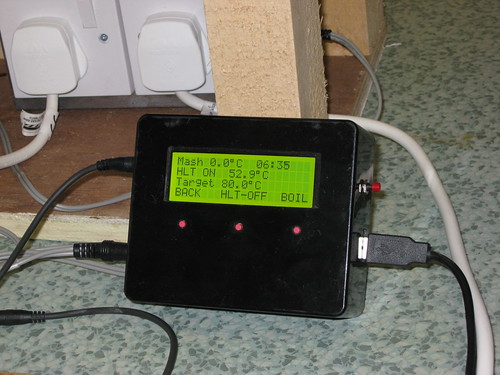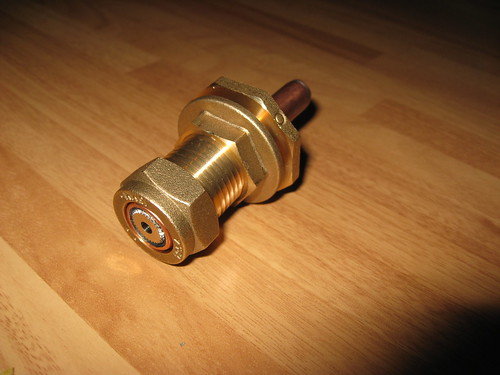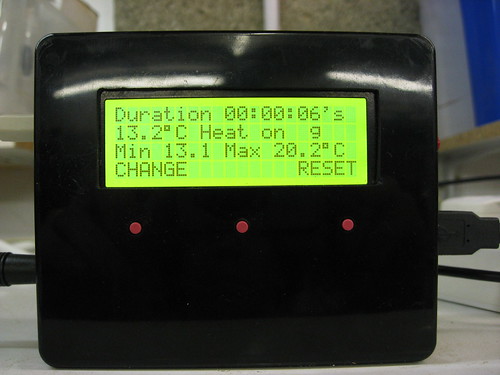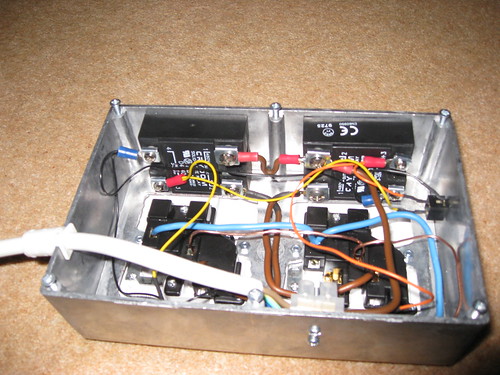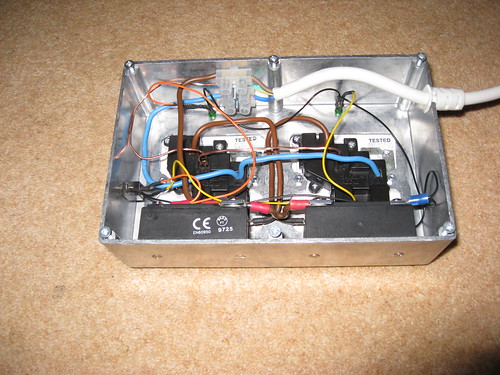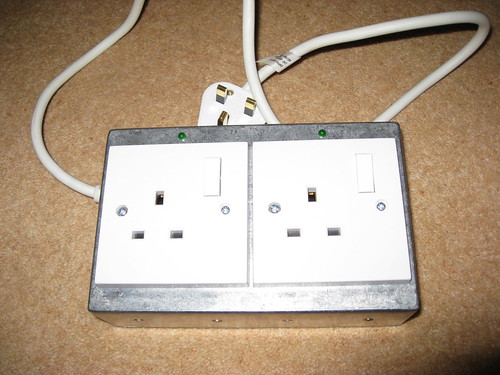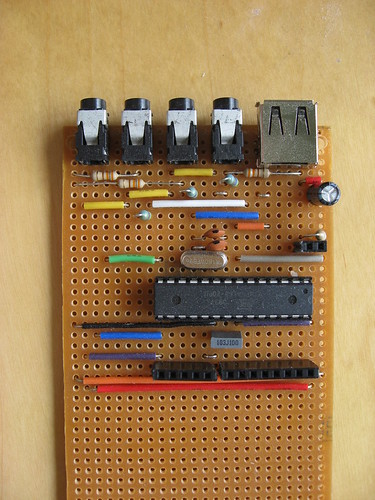So we have all the hardware, now we need the dreaded C code. Many people get frighted when they see a few hundred lines of code, but like most things take it a step at a time any you will soon have it sorted. Feel free to change, edit, publish, etc. I still have a long list of features I want to add, for example when the HLT starts I would to see the estimated time it will hit the target strike temperature.
I'd be interested in other features you think would be useful - I'll take some more screen photos when I do the next brew.
Code: Select all
//BeerComputer v2.0
//Howard Benn Apr 2010
//A super low cost controller for making all grain (AG) beer
//It uses 3 x Maxim single wire temperature probes - HLT, Mash tun, Kettle
//and the super low cost solid state relays (SSR) now available from China on eBay
//also uses a 4 line x 20 char display again low cost from China from eBay
//fits in a ATMEGA168 to save a few quid hence all the PROGMEM stuff
//include librarys
#include <MsTimer2.h> //used for the 1 second update loop
#include <LiquidCrystal.h> //used to control the LCD display - has to be Arduino 0017 or above to work properly
#include <Bounce.h> //debouncer for the switches
#include <avr/pgmspace.h> //need to store screen in PROGMEM
//define IO pins
#define RS_pin 14 //display - setup to make connection the easy
#define E_pin 15
#define D4_pin 16
#define D5_pin 17
#define D6_pin 18
#define D7_pin 19
#define button_1_pin 11 //buttons with pull-down resistors i.e off=0
#define button_2_pin 10
#define button_3_pin 12
#define heat_pin 8 // IO pins for heater and fridge
#define cool_pin 9
#define HLT_pin 8 // IO pin for HLT - same SSR as heat_pin
#define boil_pin 9 // IO pin for Boiler - same SSR as cool_pin
#define one_wire1_pin 2 //one wire interface to temperature sensors
#define one_wire2_pin 3 //one wire interface to temperature sensors
#define one_wire3_pin 4 //one wire interface to temperature sensors
// Sensor validation
#define INVALIDCRC 1
#define INVALIDMODEL 2
#define NODEVICE 3
#define SLAVEGOOD 0
//Global variables
// setup the LCD with the numbers of the interface pins
LiquidCrystal lcd(RS_pin, E_pin, D4_pin, D5_pin, D6_pin, D7_pin);
//setup the buttons
Bounce button_1 = Bounce(button_1_pin, 5);
Bounce button_2 = Bounce(button_2_pin, 5);
Bounce button_3 = Bounce(button_3_pin, 5);
//set up varable to store temp reading
// 64bit address of device
uint8_t TempAddr[8]; //address of sensor
float HLT_fridge_temp = 0; //temperature sensor 0
float mash_temp = 0; //mash tum
float boiler_temp = 0; //boiler temp
//static variables for FERM
int TargetTemp = 21; //target brewing temp for 4 - 6 day brew
#define HistTime 60000 //time in milli-seconds not to change state of the cool, warm status
long timeChanged = 0; //used to record the last time the temp went outside the +- 0.5 oC margin
long StartTime = 0; // time in millis that we start
float BrewMax = 0; // max temp during fermentation
float BrewMin = 100; // min temp during fermentation
byte cool; //true if fridge is on
byte heat; //true if heater on
//static variables for BREW
float HLTtarget = 80; //target temperature for HLT
byte HLTready = 0; //flag to change from heating to maintaining HLT temp
boolean HLToff = true; //flag to manually turn HLT off
long StartHLT = 0; //HLT on start time
long StartMash = 0; //Mash start time
long StartBoil = 0; //Boil start time
float BoilTarget = 98; //boil target to start boil time
boolean BoilOff = true; //flag to manually turn Boiler off
int BoilTime = 90; //Boil time in minutes
long StartCool = 0;
//Menu control
#define FERM 1
#define BREW 2
byte mode = 0;
byte menu = 1; //position on the menu list
/******************************
Due to the limited RAM we have to store the screen data in PROGMEM
******************************/
// 12345678901234567890
const prog_uchar string_0[] PROGMEM = "Welcome to Howard's"; // "String 0" etc are strings to store in Progmem to get over limited RAM
const prog_uchar string_1[] PROGMEM = " Big Beer Making";
const prog_uchar string_2[] PROGMEM = " Machine";
const prog_uchar string_3[] PROGMEM = "FERM TEST BREW";
// 12345678901234567890
const prog_uchar string_10[] PROGMEM = "Change Target Temp";
const prog_uchar string_11[] PROGMEM = "Current target ";
const prog_uchar string_12[] PROGMEM = "New target ";
const prog_uchar string_13[] PROGMEM = "UP SET DOWN";
// 12345678901234567890
const prog_uchar string_20[] PROGMEM = "Not connected";
const prog_uchar string_21[] PROGMEM = " ";
const prog_uchar string_23[] PROGMEM = "BACK HLT BOILER";
// 12345678901234567890
const prog_uchar string_30[] PROGMEM = "Duration ";
const prog_uchar string_31[] PROGMEM = " Fridge on";
const prog_uchar string_32[] PROGMEM = " Heat on ";
const prog_uchar string_33[] PROGMEM = " ";
const prog_uchar string_34[] PROGMEM = "Min ";
const prog_uchar string_35[] PROGMEM = " Max ";
const prog_uchar string_36[] PROGMEM = "TARGET RESET";
// 12345678901234567890
const prog_uchar string_40[] PROGMEM = "Ready to heat HLT";
const prog_uchar string_41[] PROGMEM = "Water in ?";
const prog_uchar string_42[] PROGMEM = "HLT target ";
const prog_uchar string_43[] PROGMEM = " CHANGE HEAT";
// 12345678901234567890
const prog_uchar string_50[] PROGMEM = "Heating HLT";
const prog_uchar string_51[] PROGMEM = "HLT ready ";
const prog_uchar string_52[] PROGMEM = "Temp ";
const prog_uchar string_53[] PROGMEM = " set ";
const prog_uchar string_54[] PROGMEM = "Time ";
const prog_uchar string_55[] PROGMEM = "BACK OFF MASH";
const prog_uchar string_56[] PROGMEM = "BACK ON MASH";
// 12345678901234567890
const prog_uchar string_60[] PROGMEM = "Mash ";
const prog_uchar string_61[] PROGMEM = "HLT OFF ";
const prog_uchar string_62[] PROGMEM = "HLT ON ";
const prog_uchar string_63[] PROGMEM = "Target ";
const prog_uchar string_64[] PROGMEM = "BACK HLT-OFF BOIL";
const prog_uchar string_65[] PROGMEM = "BACK HLT-ON BOIL";
// 12345678901234567890
const prog_uchar string_70[] PROGMEM = "Heating Boiler";
const prog_uchar string_75[] PROGMEM = "Boil started ";
const prog_uchar string_76[] PROGMEM = "Finish ";
const prog_uchar string_71[] PROGMEM = "Boil Target ";
const prog_uchar string_72[] PROGMEM = "Boil Temp ";
const prog_uchar string_73[] PROGMEM = "BACK OFF BOIL";
const prog_uchar string_74[] PROGMEM = "BACK ON BOIL";
// 12345678901234567890
const prog_uchar string_80[] PROGMEM = "Cool started ";
const prog_uchar string_81[] PROGMEM = "BACK FINISH";
// 12345678901234567890
const prog_uchar string_90[] PROGMEM = "All done";
const prog_uchar string_91[] PROGMEM = "Brew time ";
const prog_uchar string_92[] PROGMEM = "Press any button ";
const prog_uchar string_93[] PROGMEM = "to restart";
/******************************
PRINT FUNCTIONS
*******************************/
void LCDPrintFloat( float f){
if (f>99.9) {
lcd.print ("++.+");
return;
}
if (f<0) {
lcd.print ("--.-");
return;
}
if (f<10) lcd.print (" ");
lcd.print((int)f);
lcd.print(".");
int temp = (f - (int)f) * 10;
lcd.print( abs(temp) );
}
void LCDPrintProgMem (const prog_uchar str[]){
char c;
if(!str) return;
while((c = pgm_read_byte(str++)))
lcd.print(c,BYTE);
}
void LCDPrintTemp (float f){
LCDPrintFloat (f);
lcd.write (0xDF);
lcd.print ("C");
}
void LCDPrintInt (int i){
if (i<10) lcd.print ("0");
lcd.print (i);
}
void LCDClearLine (int line){
lcd.setCursor (0,line);
lcd.print(" ");
}
int ChangeTemp (int current) {
// change the target temperature
//Change Target Temp
//Current target 80oC
//New Target 77oC
//UP SET DOWN
int new_temp = current;
boolean set = false;
lcd.clear ();
while (!set) {
lcd.setCursor(0,0);
LCDPrintProgMem (string_10);
lcd.setCursor(0,1);
LCDPrintProgMem (string_11);
LCDPrintTemp(current);
lcd.setCursor(0,2);
LCDPrintProgMem (string_12);
LCDPrintTemp (new_temp);
lcd.setCursor(0,3);
LCDPrintProgMem (string_13);
//read buttons
if ( button_1.update() ) { //UP button
// Auto increment if the button is held
if ( button_1.read() == HIGH) {
// Make the button retrigger in 500 milliseconds
button_1.rebounce(500);
if (new_temp < 99) new_temp++;
}
}
if ( button_3.update() ) { //DOWN button
// Auto increment if the button is held
if ( button_3.read() == HIGH) {
// Make the button retrigger in 500 milliseconds
button_3.rebounce(500);
if (new_temp > 0) new_temp--;
}
}
if ( button_2.update() ) { //SET button
if ( button_2.read() == HIGH) {
set=true;
}
}
}
lcd.clear ();
return (new_temp);
}
void LCDPrintElapsedTimeDHM (long start) {
int days;
int hours;
int mins;
long TimeNow;
long ElapsedTime;
TimeNow = millis ();
ElapsedTime = TimeNow-start;
days = ElapsedTime/86400000;
hours = (ElapsedTime/3600000) % 24;
mins = (ElapsedTime/60000) % 60;
LCDPrintInt (days);
lcd.print(":");
LCDPrintInt (hours);
lcd.print(":");
LCDPrintInt (mins);
}
void LCDPrintElapsedTimeHMS (long start) {
int hours;
int mins;
int seconds;
long TimeNow;
long ElapsedTime;
TimeNow = millis ();
ElapsedTime = TimeNow-start;
hours = ElapsedTime/3600000;
mins = (ElapsedTime/60000) % 60;
seconds = (ElapsedTime/1000) % 60;
LCDPrintInt(hours);
lcd.print(":");
LCDPrintInt(mins);
lcd.print(":");
LCDPrintInt(seconds);
}
void LCDPrintElapsedTimeMS (long start) {
int mins;
int seconds;
long TimeNow;
long ElapsedTime;
TimeNow = millis ();
ElapsedTime = TimeNow-start;
mins = ElapsedTime/60000;
seconds = (ElapsedTime/1000) % 60;
LCDPrintInt(mins);
lcd.print(":");
LCDPrintInt(seconds);
}
void LCDPrintRemaining (long start, int end) {
int mins;
int seconds;
long TimeNow;
long endMS;
long TimeToGo;
TimeNow = millis ();
endMS = end * 60000; //convert from minutes to mS
TimeToGo = start + endMS - TimeNow;
mins = TimeToGo/60000;
seconds = (TimeToGo/1000) % 60;
LCDPrintInt(mins);
lcd.print(":");
LCDPrintInt(seconds);
}
/******************************
Startup screen and control
*******************************/
void LCDPrintWelcome () {
lcd.clear();
lcd.setCursor(0,0);
LCDPrintProgMem (string_0);
lcd.setCursor(0,1);
LCDPrintProgMem (string_1);
lcd.setCursor(0,2);
LCDPrintProgMem (string_2);
lcd.setCursor(0,3);
LCDPrintProgMem (string_3);
}
void WelcomeButtons (){
while (mode == 0) { //repeat until a button is pressed
if ( button_1.update() ) { //set into FERM mode
if ( button_1.read() == HIGH) {
lcd.clear();
mode = FERM;
StartTime = millis ();
cool = false; //set up fridge startup conditions
heat = false;
}
}
if ( button_2.update() ) { //Test
if ( button_2.read() == HIGH) {
lcd.clear();
Test ();
}
}
if ( button_3.update() ) { //set into BREW mode
if ( button_3.read() == HIGH) {
lcd.clear();
mode = BREW;
}
}
}
}
/******************************
Test Mode
*******************************/
void PrintTest (float temperature){
if (temperature != 0) {
LCDPrintTemp (temperature);
LCDPrintProgMem (string_21);
}
else {
LCDPrintProgMem (string_20);
}
}
void Test () {
boolean button_pushed = false;
lcd.clear();
while (!button_pushed) {
lcd.setCursor(0,0);
PrintTest (HLT_fridge_temp);
lcd.setCursor(0,1);
PrintTest (mash_temp);
lcd.setCursor(0,2);
PrintTest (boiler_temp);
lcd.setCursor(0,3);
LCDPrintProgMem (string_23);
if ( button_1.update() ) { //back to start
if ( button_1.read() == HIGH) {
LCDPrintWelcome();
button_pushed = true;
}
}
if ( button_2.update() ) { //HLT on/off
if ( button_2.read() == HIGH) {
if (!HLToff) {
HLToff = true;
digitalWrite (HLT_pin, LOW);
digitalWrite (boil_pin, LOW);
}
else {
HLToff = false;
digitalWrite (HLT_pin, HIGH);
digitalWrite (boil_pin, LOW);
}
}
}
if ( button_3.update() ) { //boiler on/off
if ( button_3.read() == HIGH) {
if (!BoilOff) {
BoilOff = true;
digitalWrite (HLT_pin, LOW);
digitalWrite (boil_pin, LOW);
}
else {
BoilOff = false;
digitalWrite (HLT_pin, LOW);
digitalWrite (boil_pin, HIGH);
}
}
}
}
}
/******************************
Fermentation control
*******************************/
void LCDPrintFerm () {
/* Calculate elapsed time and temperature, print results
Duration 12:10:30
20.1 oC Heat
Min 19.5 Max 22.2
CHANGE FERM TEMP
*/
if (HLT_fridge_temp > BrewMax) BrewMax = HLT_fridge_temp; //set max
if (HLT_fridge_temp < BrewMin) BrewMin = HLT_fridge_temp; //set min
lcd.setCursor(0,0);
LCDPrintProgMem (string_30);
LCDPrintElapsedTimeDHM (StartTime);
lcd.setCursor(0,1);
LCDPrintTemp (HLT_fridge_temp);
if (cool) LCDPrintProgMem (string_31);
if (heat) LCDPrintProgMem (string_32);
if (!cool & !heat) LCDPrintProgMem (string_33);
lcd.setCursor(0,2);
LCDPrintProgMem (string_34);
LCDPrintFloat (BrewMin);
LCDPrintProgMem (string_35);
LCDPrintTemp (BrewMax);
lcd.setCursor(0,3);
LCDPrintProgMem (string_36);
if ( button_1.update() ) { //change button
if ( button_1.read() == HIGH) {
TargetTemp = ChangeTemp (TargetTemp);
}
}
if ( button_3.update() ) { //reset max and min
if ( button_3.read() == HIGH) {
BrewMax = HLT_fridge_temp;
BrewMin = HLT_fridge_temp;
}
}
}
void ControlTemp (){
//Controls the Fridge internal temperature - uses a 0.5 degree historysis and a programmable delay
//to prevent the fridge going on and off too often
//Thought about using the PID lib, but a bit over the top for this
long timeNow;
timeNow = millis();
if ((timeNow - timeChanged) < HistTime) return; // don't do anything if there has been a recent change
//check if we need to turn the fridge on
if (HLT_fridge_temp > (TargetTemp + 0.5)) {
if (cool == false) {
timeChanged = millis(); //if we change state note time
cool = true;
digitalWrite(cool_pin, HIGH); //fridge relay on
}
}
else {
if (cool == true) {
timeChanged = millis();
cool = false;
digitalWrite(cool_pin, LOW); //fridge relay off
}
}
// check if we need to turn the heater on
if (HLT_fridge_temp < (TargetTemp - 0.5)) {
if (heat == false){
timeChanged = millis();
heat = true;
digitalWrite(heat_pin, HIGH); //heat relay on
}
}
else {
if (heat == true) {
timeChanged = millis();
heat = false;
digitalWrite(heat_pin, LOW); //heat relay off
}
}
}
/******************************
Brew mode
*******************************/
void MenuUpDown () {
if ( button_1.update() ) { //Back
if ( button_1.read() == HIGH) {
if (menu > 1) menu--;
lcd.clear();
}
}
if ( button_3.update() ) { //Forward
if ( button_3.read() == HIGH) {
menu++;
lcd.clear();
}
}
}
void HLTcontrol () {
if (HLToff) { //HLT forced off by MMI
digitalWrite (HLT_pin, LOW);
return;
}
if (HLT_fridge_temp < HLTtarget) {
digitalWrite (boil_pin, LOW); //only ever allow 1 element to be on at a time
digitalWrite (HLT_pin, HIGH);
}
else {
digitalWrite (boil_pin, LOW);
digitalWrite (HLT_pin, LOW);
HLTready = true;
}
}
void LCDStartHLT () {
/* get ready to turn HLT on
Ready to heat HLT
Water in?
Current target 80oC
BACK CHANGE HEAT
*/
lcd.setCursor(0,0);
LCDPrintProgMem (string_40);
lcd.setCursor(0,1);
LCDPrintProgMem (string_41);
lcd.setCursor(0,2);
LCDPrintProgMem (string_42);
LCDPrintTemp(HLTtarget);
lcd.setCursor(0,3);
LCDPrintProgMem (string_43);
MenuUpDown (); //check for menu changes
if ( button_2.update() ) { //change button
if ( button_2.read() == HIGH) {
HLTtarget = ChangeTemp (HLTtarget);
}
}
}
void LCDHeatHLT () {
/* HLT on
Heating HLT
Current 66 target 80
Time 0:20:30
BACK OFF MASH */
if (StartHLT == 0) {
StartHLT = millis(); //set starttime first time around
HLToff = false;
}
lcd.setCursor(0,0);
if (!HLTready){
LCDPrintProgMem (string_50);
}
else {
LCDPrintProgMem (string_51);
}
lcd.setCursor(0,1);
LCDPrintProgMem (string_52);
LCDPrintFloat (HLT_fridge_temp);
LCDPrintProgMem (string_53);
LCDPrintTemp(HLTtarget);
lcd.setCursor(0,2);
LCDPrintProgMem (string_54);
LCDPrintElapsedTimeHMS (StartHLT);
lcd.setCursor(0,3);
if (!HLToff) {
LCDPrintProgMem (string_55);
}
else {
LCDPrintProgMem (string_56);
}
MenuUpDown (); //check for menu changes
if ( button_2.update() ) { //change button
if ( button_2.read() == HIGH) {
if (!HLToff) HLToff = true;
else HLToff = false;
}
}
HLTcontrol ();
}
void LCDMash () { //NEED TO SORT setting target temp ?
/*
Mash 66.3oC 40:53
HLT off 50.4oC
target 80.0oC
BACK HLT_ON BOIL */
if (StartMash == 0) StartMash = millis(); //set starttime first time around
lcd.setCursor(0,0);
LCDPrintProgMem (string_60);
LCDPrintTemp (mash_temp);
lcd.print (" ");
LCDPrintElapsedTimeMS (StartMash);
lcd.setCursor(0,1);
if (HLToff) {
LCDPrintProgMem (string_61);
}
else {
LCDPrintProgMem (string_62);
}
LCDPrintTemp (HLT_fridge_temp);
lcd.setCursor(0,2);
LCDPrintProgMem (string_63);
LCDPrintTemp (HLTtarget);
lcd.setCursor(0,3);
if (!HLToff) {
LCDPrintProgMem (string_64);
}
else {
LCDPrintProgMem (string_65);
}
MenuUpDown (); //check for menu changes
if ( button_2.update() ) { //change button
if ( button_2.read() == HIGH) {
if (!HLToff) {
HLToff = true;
}
else {
HLToff = false;
}
}
}
HLTcontrol ();
}
void LCDHeatBoiler () { //Heat Boiler until we hit target temp then start timer
/*
Heating Boiler
Boil target 98 oC
Boiler 80.2 oC
BACK OFF BOIL
*/
lcd.setCursor(0,0);
LCDPrintProgMem (string_70);
lcd.setCursor(0,1);
LCDPrintProgMem (string_71);
LCDPrintTemp (BoilTarget);
lcd.setCursor(0,2);
LCDPrintProgMem (string_72);
LCDPrintTemp (boiler_temp);
lcd.setCursor(0,3);
if (!BoilOff) {
LCDPrintProgMem (string_73);
digitalWrite (HLT_pin, LOW); //always make sure HLT is iff before we turn the boiler on
digitalWrite (boil_pin, HIGH);
}
else {
LCDPrintProgMem (string_74);
digitalWrite (boil_pin, LOW);
}
MenuUpDown (); //check for menu changes
if ( button_2.update() ) { //change button
if ( button_2.read() == HIGH) {
if (!BoilOff) {
BoilOff = true;
}
else {
BoilOff = false;
}
}
}
}
void LCDBoil () { //Boil and display timer
/*
Boil started 24:30
Finish 63:20
Temp 99 oC
BACK OFF COOL
*/
if (StartBoil == 0) {
StartBoil = millis(); //set starttime first time around
}
lcd.setCursor(0,0);
LCDPrintProgMem (string_75);
LCDPrintElapsedTimeMS (StartBoil);
lcd.setCursor(0,1);
LCDPrintProgMem (string_76);
LCDPrintRemaining (StartBoil, BoilTime);
lcd.setCursor(0,2);
LCDPrintProgMem (string_72);
LCDPrintTemp (boiler_temp);
lcd.setCursor(0,3);
if (!BoilOff) {
LCDPrintProgMem (string_73);
digitalWrite (HLT_pin, LOW); //always make sure HLT is iff before we turn the boiler on
digitalWrite (boil_pin, HIGH);
}
else {
LCDPrintProgMem (string_74);
digitalWrite (boil_pin, LOW);
}
MenuUpDown (); //check for menu changes
if ( button_2.update() ) { //change button
if ( button_2.read() == HIGH) {
if (!BoilOff) {
BoilOff = true;
}
else {
BoilOff = false;
}
}
}
}
void LCDCool () { //Boil and display timer
/*
Cool started 24:30
Temp 99 oC
BACK FINISH
*/
if (StartCool == 0) {
StartCool = millis(); //set starttime first time around
digitalWrite (boil_pin, LOW); // turn element off
}
lcd.setCursor(0,0);
LCDPrintProgMem (string_80);
LCDPrintElapsedTimeMS (StartCool);
lcd.setCursor(0,2);
LCDPrintProgMem (string_52);
LCDPrintTemp (boiler_temp);
lcd.setCursor(0,3);
LCDPrintProgMem (string_81);
MenuUpDown (); //check for menu changes
}
void LCDFinish () {
lcd.setCursor(0,0);
LCDPrintProgMem (string_90);
lcd.setCursor(0,1);
LCDPrintProgMem (string_91);
LCDPrintElapsedTimeHMS (StartHLT);
lcd.setCursor(0,2);
LCDPrintProgMem (string_92);
lcd.setCursor(0,3);
LCDPrintProgMem (string_93);
if ( button_1.update() || button_2.update() || button_3.update() ) { //any button
if ( (button_1.read() || button_2.read() || button_3.read()) == HIGH) {
mode = 0;
}
}
}
/******************************
Setup
*******************************/
void OneSecondLoop() {
//read the existing stored temperature values from RAM
//start the next conversion - takes around 750mS so should be ready next time we get here
//Need to remember and reset the pin to make the test loops work
uint8_t pin;
pin = get_pin();
change_pin (one_wire1_pin); //set to first sensor
HLT_fridge_temp = getTempC(); //temperature sensor 0
globalTempRequest();
change_pin (one_wire2_pin);
mash_temp = getTempC(); //mash tum
globalTempRequest();
change_pin (one_wire3_pin);
boiler_temp = getTempC(); //boiler temp
globalTempRequest();
change_pin (pin);
}
void setup() {
// set up the LCD's number of columns and rows:
lcd.begin(20,4);
//configure pins - inputs are defaulted
pinMode(heat_pin, OUTPUT);
pinMode(cool_pin, OUTPUT);
// turn SSRs off
digitalWrite (heat_pin, LOW);
digitalWrite (cool_pin, LOW);
SetAddress (&TempAddr[0]);
MsTimer2::set(1000, OneSecondLoop); // 1 second loop
MsTimer2::start();
}
void loop() {
switch (mode) {
case 0:
LCDPrintWelcome();
WelcomeButtons ();
break;
case 1:
ControlTemp ();
LCDPrintFerm ();
break;
case 2:
switch (menu){
case 1:
LCDStartHLT ();
break;
case 2:
LCDHeatHLT ();
break;
case 3:
LCDMash ();
break;
case 4:
LCDHeatBoiler ();
break;
case 5:
LCDBoil ();
break;
case 6:
LCDCool ();
break;
case 7:
LCDFinish ();
break;
}
break;
}
}
You will also need the temp sensor code
Code: Select all
//Tiny temp - small version of OneWire and DallasTemperature
//with only one sensor per wire but with hot swap
// This is ripped off from the DallasTemperature library,
// and you can ONLY have a single sensor per wire
// The only functions you need are reset to see if there is a device on the bus
// Skip to read without address
// Read scratchpad to read temp
#include <inttypes.h>
#include "OneWire2.h"
#define STARTCONVO 0x44 // Tells device to take a temperature reading and put it on the scratchpad
#define COPYSCRATCH 0x48 // Copy EEPROM
#define READSCRATCH 0xBE // Read EEPROM
#define WRITESCRATCH 0x4E // Write to EEPROM
#define RECALLSCRATCH 0xB8 // Reload from last known
#define READPOWERSUPPLY 0xB4 // determine if device needs parasite power
#define DS18S20MODEL 0x10 // Model ID
#define DS18B20MODEL 0x28 // Model ID
#define DS1822MODEL 0x22 // Model ID
// device resolution
#define TEMP_9_BIT 0x1F // 9 bit
#define TEMP_10_BIT 0x3F // 10 bit
#define TEMP_11_BIT 0x5F // 11 bit
#define TEMP_12_BIT 0x7F // 12 bit
// One Wire address
//OneWire2 *pDataWire;
OneWire2 pDataWire(one_wire1_pin);
// 64bit address of device
uint8_t *arSlaveAddr;
// temperature LSB
uint8_t tempLSB;
// temperature MSB
uint8_t tempMSB;
// T(high)
uint8_t highAlarmTemp;
// T(low)
uint8_t lowAlarmTemp;
// device configuration
uint8_t resolution;
void change_pin (uint8_t pin)
{
pDataWire.change_pin (pin);
}
uint8_t get_pin () {
return (pDataWire.get_pin());
}
// read length bytes of a device's scratch pad
void readScratchPad(uint8_t length)
{
// sanity check
if (length > 8) length = 8;
// send the command
pDataWire.reset();
pDataWire.skip();
pDataWire.write(READSCRATCH);
// read the response
for (uint8_t i = 0; i <= length; i++)
switch (i)
{
case 0:
// byte 0: temperature LSB
tempLSB = pDataWire.read();
break;
case 1:
// byte 1: temperature MSB
tempMSB = pDataWire.read();
break;
case 2:
// byte 2: high alarm temp
highAlarmTemp = pDataWire.read();
break;
case 3:
// byte 3: low alarm temp
lowAlarmTemp = pDataWire.read();
break;
case 4:
// byte 4:
// this is really the configuration register, but for
// our purposes, this is how we'll think of it
resolution = pDataWire.read();
break;
case 5:
case 6:
case 7:
case 8:
break;
}
pDataWire.reset();
}
void SetAddress (uint8_t *newAddr) {
arSlaveAddr = newAddr;
}
// Validate whether the current address is correct
int CheckSensor()
{
if (pDataWire.reset() == false) {
return NODEVICE;
}
pDataWire.read_rom (arSlaveAddr);
// Calculate Cycle-Redudancy-Check (ie: check the data is not invalid
if (OneWire2::crc8(arSlaveAddr, 7) != arSlaveAddr[7]) {
return INVALIDCRC;
}
if (!(arSlaveAddr[0] == DS18B20MODEL
|| arSlaveAddr[0] == DS18S20MODEL
|| arSlaveAddr[0] == DS1822MODEL
)){
return INVALIDMODEL;
}
// Return all good
readScratchPad(8); // read the scratchpad to set model, resolution etc
return SLAVEGOOD;
}
// returns a float with the temperature in degrees C.
float getTemperature()
{
// If we're ready to rock, begin communication channel
if (CheckSensor() != SLAVEGOOD) return 0; // return a value outside our range
// The temp is the first two bytes so just request those 2
readScratchPad(2);
int16_t rawTemperature = (((int16_t) tempMSB) << 8) | tempLSB;
switch (arSlaveAddr[0]) {
case DS18B20MODEL:
case DS1822MODEL:
switch (resolution)
{
case TEMP_12_BIT:
return (float)rawTemperature * 0.0625;
break;
case TEMP_11_BIT:
return (float)(rawTemperature >> 1) * 0.125;
break;
case TEMP_10_BIT:
return (float)(rawTemperature >> 2) * 0.25;
break;
case TEMP_9_BIT:
return (float)(rawTemperature >> 3) * 0.5;
break;
}
break;
case DS18S20MODEL:
return (float)rawTemperature * 0.5;
break;
}
}
// sends convert temperature to all devices on the NewOneWire connection.
// only one device on each bus needs to do this. ideally, it should be
// on your highest resolution device so if a delay is necessary, it will
// be long enough
void globalTempRequest()
{
pDataWire.reset();
pDataWire.skip();
pDataWire.write(STARTCONVO);
}
// returns temperature in degrees C
float getTempC()
{
return getTemperature();
}
// returns temperature in degrees F
float getTempF()
{
return (getTemperature() * 1.8) + 32;
}
// Convert float celcius to fahrenheit
float toFahrenheit(float celcius)
{
return (celcius*1.8)+32;
}
